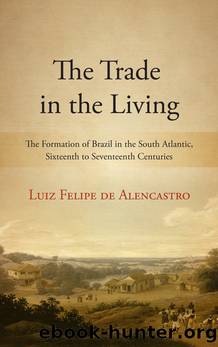Trade in the Living, The by Luiz Felipe de Alencastro

Author:Luiz Felipe de Alencastro [Alencastro, Luiz Felipe de]
Language: eng
Format: epub
Tags: History, Latin America, South America, Social Science, Slavery
ISBN: 9781438469317
Google: RatxDwAAQBAJ
Publisher: SUNY Press
Published: 2018-10-09T22:28:50+00:00
The Victory of the Cachaça
In the first decades of the Angola invasion, after a number of failures in the sale of mainland wine, the Portuguese began to export more alcoholic wines from the Canary Islands, Madeira, and Malaga into West Central Africa.286 The sales of the Spanish product increased during the Asiento period, when there was a true triangular trade involving Angola. The asentista vessels left Seville or Lisbon loaded with wines, spirits, and other products for African markets, sold or exchanged their load in the trade ports, and embarked slaves for the Spanish-American ports. Iberian wine was the main exchange merchandise in the society formed by Governor Manuel Forjaz, an enterprise aiming to export Angolan slaves into Spanish America.287 A text of the first quarter of the seventeenth century records that Spanish wine yielded a 500 percent profit in Central Africa.288
Most of the imported amounts of wine and Portuguese grape spirit, today known as bagaceira, were sent to the lands of Kasanje and Matamba, from which most Africans were deported after 1648.289 But the Spanish wine disseminated continued to enjoy preference in regional markets. Contrary to the royal orders banning Castilian trade in Angola after the Braganza Restoration (except if the Spanish slave traders brought in gold and silver coins for the purchase of slaves), four vessels from Spain arrived in Luanda laden with clay wine casks. Supported by metropolitan producers and exporters, the Crown again banned such commerce in 1655.290 A few years later, mainland merchants and their Luandan agents realized that the Brazilian cachaça had also been taking a section of the Angolan market from them.291
Jeribita was the name by which the cachaça became known and traded in the West Central African hinterlands (but not in the Mina Coast, where the tobacco trade prevailed). Gregório de Matos used the word as if it were current in 1600s Bahia. Later, in the nineteenth century, Father Lopes Gama made the same remark regarding the Pernambucoâs speech. According to dictionarist Bluteau, the word was of Brazilian origin.292 It is very likely. Jeribá is the Tupi name of a common Brazilian-coast palm tree, and at the beginning of the 1600s a palm-tree wine similar to that made in the Africa was fabricated in Portuguese America.293 Thus, the word jeribita could have been diffused in Africa in reference to the wine made from the Brazilian palm tree, the jeribá. In the inverse itinerary, marafo (from malafo), became, among Brazilians, and especially in Rio de Janeiro, a synonym for cachaça.294 Alongside the derivatives (birita, piribita, and jurubita), other Brazilian synonyms for cachaça are found that originate in African vocabularies or refer to that part of the globe: angico, canjica, cumbe, geba, maçangana, malunga, mamãe-de-luanda, and otim (Yoruba).295 Among such names, malunga deserves attention.
Malungo, mulunga, or malongo are Kimbundu synonyms designating the iron chains with which the captives were restrained. On this side of the slave trade, malungo came to mean the name given to those who came aboard the same slaver, and later, to the slaves belonging to a single master, or bound to the same plantation.
Download
This site does not store any files on its server. We only index and link to content provided by other sites. Please contact the content providers to delete copyright contents if any and email us, we'll remove relevant links or contents immediately.
| Argentina | Bolivia |
| Brazil | Chile |
| Colombia | Ecuador |
| Guyana | Paraguay |
| Peru | Suriname |
| Uruguay | Venezuela |
Cat's cradle by Kurt Vonnegut(15334)
Pimp by Iceberg Slim(14484)
4 3 2 1: A Novel by Paul Auster(12372)
Underground: A Human History of the Worlds Beneath Our Feet by Will Hunt(12085)
The Radium Girls by Kate Moore(12017)
Wiseguy by Nicholas Pileggi(5769)
The Fire Next Time by James Baldwin(5431)
Perfect Rhythm by Jae(5398)
American History Stories, Volume III (Yesterday's Classics) by Pratt Mara L(5298)
Paper Towns by Green John(5177)
Pale Blue Dot by Carl Sagan(4996)
A Higher Loyalty: Truth, Lies, and Leadership by James Comey(4951)
The Mayflower and the Pilgrims' New World by Nathaniel Philbrick(4490)
The Doomsday Machine by Daniel Ellsberg(4484)
Killers of the Flower Moon: The Osage Murders and the Birth of the FBI by David Grann(4435)
The Sympathizer by Viet Thanh Nguyen(4384)
Too Much and Not the Mood by Durga Chew-Bose(4337)
The Borden Murders by Sarah Miller(4312)
Sticky Fingers by Joe Hagan(4188)
